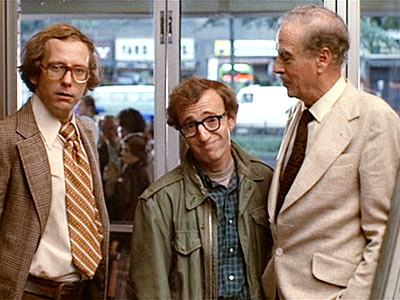Woody Allen's Annie Hall is a witty and almost dream-like film. Filled with fantasy, reality and humor Allen makes so much out of a film where people mostly walk and talk. In fact, Roger Ebert wrote in his Great Movies column that the character of Alvy Singer, "lives in order to talk about living", which I think is exactly right.
But this is so movie is so much more than talking, as wonderful and hilarious as the dialogue is! One of Annie Hall's great strengths is that its structure is varied and engaging. From the first three scenes it is obvious that Allen's film is taking a unique approach to storytelling. The opening titles (which, I'm counting as the first scene) are completely silent with no flashy graphics, only a simple black background and white text. Then Alvy looks straight at the viewer, much like in his stand up performances, and begins to talk.
This spare beginning sets up what the film will consistently deliver, talking about relationships. This uncomplicated premise leaves room for creativity in the way the film is presented. Many of the scenes are flashbacks and most have atypical framing, such as the first scene where Alvy and his friend are walking down the street in a conversation. At first, they are barely visible, if at all, and slowly they come into the frame. Here, the camera is waiting for the actors to catch up and it creates a confusing experience of the viewer trying to find who is speaking. This puts the emphasis on what is being said rather than on what is seen. Annie Hall's dialogue is perhaps more important than some of the imagery. The viewer is taught by this framing to roll with the punches of Annie Hall's unconventionality.
I particularly enjoyed Annie Hall's confidence in directly addressing the viewer in scenes like the line in the movie theater, where Alvy looks right at us and says, "Boy, if life were only like this!"At another point, characters argue whether the story they are telling is correct and speak as if they are actively concerned with what the viewer is hearing. These breaks give the movie a kind of spark and humor. It is almost as if we are also engaged in the making of this movie and the film is not complete without those who see it, otherwise Alvy speaks to no one in more ways that one.
The failure of a traditional love story between Alvy and Annie is explored thoroughly in the film. Alvy and Annie break up and get back together but by the end of the film the two of them decide to share their memories over coffee and go their separate ways. I first thought Annie Hall would be a film about "what went wrong" in their love life but I saw it more as the stories Alvy and Annie were sharing with each other at the end of the film. They show the good times, the bad times and their sense of humor through it all. In fact, in one scene Alvy and Annie are walking through their memories and commenting on what they think of themselves now. The whole of Annie Hall is like this one scene.
As Ebert wrote about dialogue in Annie Hall in the same article previously mentioned, "This is not merely dialogue, it is a double act in the process of discovering itself" This is essentially the reality of the relationship between the viewer and the film. The art is created in order to exist in the interpretation of an outside source.
Amicably returning to their memories shows how although they lost their love for one another, they simply turned into friends....or just two people with a lot of history together! (if they never spend time together again) For all of Alvy's reminders of death and the misery of life, this view of relationships is quite positive. There is no hate for one another, just differences to talk about.
-Claudia


No comments:
Post a Comment